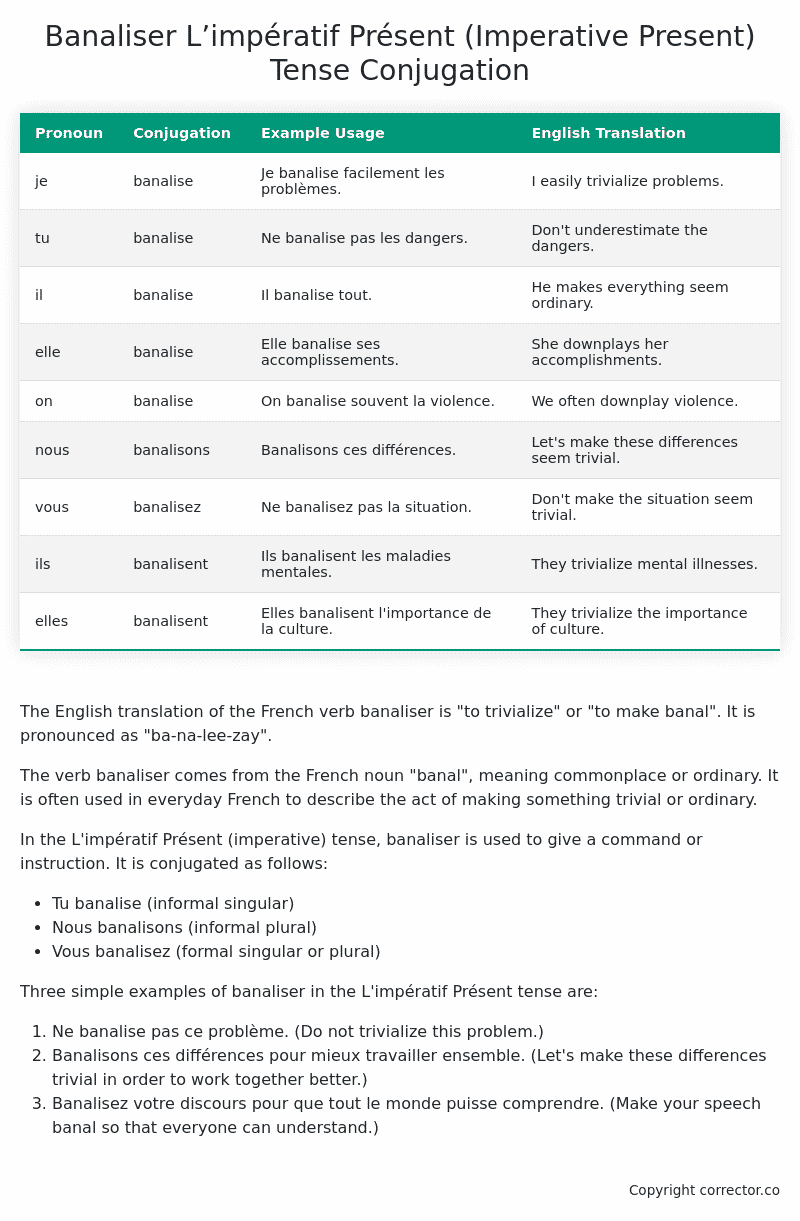L’impératif Présent (Imperative Present) Tense Conjugation of the French Verb banaliser
Introduction to the verb banaliser
The English translation of the French verb banaliser is “to trivialize” or “to make banal”. It is pronounced as “ba-na-lee-zay”.
The verb banaliser comes from the French noun “banal”, meaning commonplace or ordinary. It is often used in everyday French to describe the act of making something trivial or ordinary.
In the L’impératif Présent (imperative) tense, banaliser is used to give a command or instruction. It is conjugated as follows:
- Tu banalise (informal singular)
- Nous banalisons (informal plural)
- Vous banalisez (formal singular or plural)
Three simple examples of banaliser in the L’impératif Présent tense are:
- Ne banalise pas ce problème. (Do not trivialize this problem.)
- Banalisons ces différences pour mieux travailler ensemble. (Let’s make these differences trivial in order to work together better.)
- Banalisez votre discours pour que tout le monde puisse comprendre. (Make your speech banal so that everyone can understand.)
Table of the L’impératif Présent (Imperative Present) Tense Conjugation of banaliser
| Pronoun | Conjugation | Example Usage | English Translation |
|---|---|---|---|
| je | banalise | Je banalise facilement les problèmes. | I easily trivialize problems. |
| tu | banalise | Ne banalise pas les dangers. | Don’t underestimate the dangers. |
| il | banalise | Il banalise tout. | He makes everything seem ordinary. |
| elle | banalise | Elle banalise ses accomplissements. | She downplays her accomplishments. |
| on | banalise | On banalise souvent la violence. | We often downplay violence. |
| nous | banalisons | Banalisons ces différences. | Let’s make these differences seem trivial. |
| vous | banalisez | Ne banalisez pas la situation. | Don’t make the situation seem trivial. |
| ils | banalisent | Ils banalisent les maladies mentales. | They trivialize mental illnesses. |
| elles | banalisent | Elles banalisent l’importance de la culture. | They trivialize the importance of culture. |
Other Conjugations for Banaliser.
Le Present (Present Tense) Conjugation of the French Verb banaliser
Imparfait (Imperfect) Tense Conjugation of the French Verb banaliser
Passé Simple (Simple Past) Tense Conjugation of the French Verb banaliser
Passé Composé (Present Perfect) Tense Conjugation of the French Verb banaliser
Futur Simple (Simple Future) Tense Conjugation of the French Verb banaliser
Futur Proche (Near Future) Tense Conjugation of the French Verb banaliser
Plus-que-parfait (Pluperfect) Tense Conjugation of the French Verb banaliser
Passé Antérieur (Past Anterior) Tense Conjugation of the French Verb banaliser
Futur Antérieur (Future Anterior) Tense Conjugation of the French Verb banaliser
Subjonctif Présent (Subjunctive Present) Tense Conjugation of the French Verb banaliser
Subjonctif Passé (Subjunctive Past) Tense Conjugation of the French Verb banaliser
Subjonctif Imparfait (Subjunctive Imperfect) Tense Conjugation of the French Verb banaliser
Subjonctif Plus-que-parfait (Subjunctive Pluperfect) Tense Conjugation of the French Verb banaliser
Conditionnel Présent (Conditional Present) Tense Conjugation of the French Verb banaliser
Conditionnel Passé (Conditional Past) Tense Conjugation of the French Verb banaliser
L’impératif Présent (Imperative Present) Tense Conjugation of the French Verb banaliser (this article)
L’infinitif Présent (Infinitive Present) Tense Conjugation of the French Verb banaliser
Struggling with French verbs or the language in general? Why not use our free French Grammar Checker – no registration required!
Get a FREE Download Study Sheet of this Conjugation 🔥
Simply right click the image below, click “save image” and get your free reference for the banaliser L’impératif Présent tense conjugation!

Banaliser – About the French L’impératif Présent (Imperative Present) Tense
Usage
Giving commands
Making requests
Offering advice
Expressing desires
Conjugation Formation
Interactions with other tenses
Want More?
I hope you enjoyed this article on the verb banaliser. Still in a learning mood? Check out another TOTALLY random French verb conjugation!


